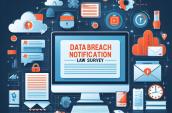Presentation to Western Regional
Home Management and Family Economics Educators
Salt Lake City, Utah
By Beth Givens, Director
Privacy on the Internet is exploding as a topic of public concern these days. Recent surveys have found that 4 out 5 Net users are concerned about threats to their privacy when they're online. Yet only 6% of them have actually experienced privacy abuses.
Those who are not yet on the Net cite privacy as the main reason they have chosen not to become Internet users. If electronic commerce is going to thrive, this fear is going to have to be dealt with by laws and by industry practices. The Clinton Administration is counting on industry to regulate itself, something I will touch on later.
Here are the key privacy concerns noted in a recent Lou Harris Poll:
1. Someone tracking what web sites people visit and then using that information improperly.
2. Personally identifiable public record information being put on the Net -- example San Diego County property assessment records will be placed on the Net in the near future -- but the County plans to leave personal names off, allowing access only by address.
3. People reading e-mail that is not addressed to them.
4. Websites collecting visitors' e-mail addresses without their consent in order to compile e-mail marketing lists.
I am going to cover some of the reality and some of the hype about privacy on the Internet -- just what you can and cannot find out about people on the Net. I will also cover some of the public policy initiatives of this past year -- what the Federal Trade Commission has been up to, for example.
I'll bet many of you have received junk e-mail messages that go something like this:
You can find out ANYTHING about ANYONE on the net.
- Find that old romantic interest
- Dig dirt on your neighbors.
- Find out if your fellow employee was jailed on sex charges.
- Perform background checks.
- Check credit, driving or criminal records.
- Verify income.
- Find out the background of your children's friends and their dates.
- Order our report SNOOPING THE INTERNET -- just $29.95.
What's going on here? Are these promises true? Or exaggerations.
A little bit of both.
You can find out simple directory information about people on a variety of web sites, which you are no doubt aware of -- Switchboard, Whowhere, Four11. These contain telephone book information, so if you're unlisted, you won't be in such web sites. And most of these sites have ways you can get your information removed.
But if you go beyond the free services to fee-based services, yes, you can find out a great deal about individuals on the Internet. There are services like as KnowX and LexisNexis to which you subscribe and then access them either through the Internet or through their own telephone networks. The information they provide is primarily from public records.
- Records of court cases, both civil and criminal (not the full text, not yet anyway, but an index of cases).
- Bankruptcies, judgements and liens.
- Property records, such as county tax assessors files.
- Professional license information, if regulated by the state.
- Dept of Motor Vehicle data from many states (not California).
- Voter registration data from many states, not California.
- Stock investments, if you own 15% or more of a company's stock.
You can find out a great deal about people through public records. I tell people who call the hotline wondering what's "out there" about them that if they've led a complicated life, there's likely to be a great deal of information about them in public records data bases -- if they've been involved in court cases, own lots of property, if they've been in business and have needed to secure loans, have filed for bankruptcy, have been divorced. And so on.
But what about medical records, your long distance telephone calling records, your banking account information, and other highly sensitive data, normally thought of as confidential and protected by laws? There are a number of information vendors that appear to work outside the law. They promise they can get these types of information ... and they can. But they're not using the Internet, or even subscriber based services to get that information. They're using old-fashioned private investigator tricks of pretext interviews -- using phony stories and pretending to be you, for example, to get your long distance phone calling information or your medical records -- or having an inside contact whom they pay off.
Visit the web site of Advanced Research Inc. as an example of such a service, www.advsearch.com
Another place to find such services is the web site called Pimall -- www.pimall.com
If some of this information sleuthing is against the law, what's being done about it?
Fortunately, Congress and federal government agencies are beginning to investigate such illicit service
s. Congressman Leach has introduced H.R. 4321 to prohibit using pretext interviews to gain financial information.
But for legal information gathering practices, the Clinton Administration, so far anyway, is looking at industry self regulation to protect our privacy. I'm not convinced that consumers can get the strong privacy protection they want and need from self regulation, but that's the topic of another speech sometime, not this one.
You are going to hear a lot about self regulation in the coming year.
The Federal Trade Commission is monitoring commercial web sites that gather information about people who visit them to see if they have privacy policies prominently posted which disclose the information gathering practices of the company behind the web site. They recently released the results of a survey of 1,400 web sites and found that 92% of them gather information. But only 14% of them disclosed their information collection practices. Worse, 89% of children's oriented sites collect information and only 10% provide for some kind of parental permission. The Federal Trade Commission has stated that if these numbers don't improve, they will recommend legislation to enforce disclosure policies. You may remember a news story from a few weeks ago in which the FTC cracked down on the megasite Geocities for its deceptive information-gathering practices. We are going to see more of this type of activity from the FTC.
By the way, there is a lot of privacy information on the Federal Trade Commission's web site, A good place to visit -- www.ftc.gov. They also have produced the free brochure, "A Consumer's Guide to Travel in Cyberspace: Site-Seeing on the Internet." This would be a good resource for your students.
If you'd like to find out more about industry self regulatory efforts, here are some web sites to visit:
Online Privacy Alliance -- www.privacyalliance.org
Individual Reference Services Group -- www.irsg.org
Truste -- www.truste.org
BBB -- www.bbbonline.org
And we have recently published a 12-page guide on Children in Cyberspace. It's fact sheet 21 on our web site.
Here are some tips for consumers to safeguard privacy when web browsing.
First, always look for the privacy policy of the web site you're visiting. Many commercial web sites are signing up with a web branding service. Like TRUSTe -- where you'll see a logo that indicates that they follow certain disclosure practices. BBBOnline is going to have a web branding service too.
Second, do not send sensitive personal information like phone numbers, passwords, address, credit card number, and Social Security number, to chat lines, on forum postings, via e-mail, or in your online biography. Assume that your communications are not private, unless they're encrypted.
Thank you for your interest in this topic.



